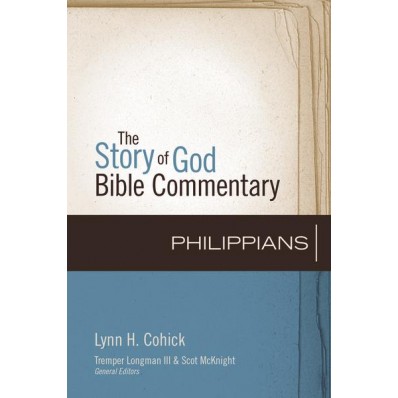Cohick’s new commentary on Paul’s epistle to the Philippians is one of two, along with a commentary on the Sermon on the Mount by Scott McKnight, to be released in a new popular level series by Zondervan, called The Story of God Bible Commentary. Both have been written by members of the editorial board for the series, and excerpted previews are available for free download from the series website storyofgodseries.com.
As a commentary series launch, Cohick does a good job of modeling the aims of the series, which are to “explain and illuminate each passage of Scripture in light of the Bible’s grand story.” This emphasis on the narrative movement throughout the entirety of Scripture appears in Cohick’s analysis of Philippians, among other things, by a recurring reference to the Philippian believers’ faith as a “journey” (2, 67, 140, 226). She writes in the introduction: “Jesus’ story reshapes our story. A believer’s past, present, and future take on redeemed significance as Jesus’ story infuses our story” (2). She also speaks of the letter’s ability to “draw readers into Paul’s story, which is part of the larger story written by God for the church” (10).
In the commentary, Cohick draws on substantial academic resources, reflected in the insightful way in which she weaves recent Pauline scholarship into her exposition. Additionally, and not always found in connection high level scholarship, Cohick is able to pull from her wealth of pastoral experience on the mission field in Africa. Anecdotes often appear in her application sections after each textual exposition (entitled Live the Story).
The biggest strength of this commentary is its accessibility to pastors and lay-level Christians. Cohick is thoroughly immersed in the academic world of Pauline studies, which facilitates her ability to guide readers (who may not be up-to-date in the field) quickly and succinctly to the key ideas necessary for understanding the text. This is apparent in the introduction, in which she touches on all of the major debates current within Philippians scholarship (literary integrity, genre, community formation, union with Christ, social and political background, opponents, etc.). Though the nature of the commentary requires interaction with these debates to be brief, she uses a few key footnotes to direct readers to the leading scholarship in the field on each respective issue. These brief yet precise footnotes continue throughout, demonstrating thorough interaction with scholarship on Philippians that is then boiled down into the bare essentials for the final product.
Cohick gives as the thesis for the book of Philippians, which she refers to as “the overarching burden of Paul’s message to the Philippians,” the call to “stand fast in the hope of Christ, and stand together in the Spirit” (209). On the whole, she provides clear presentations of her positions on key issues involving Philippians interpretation. For instance, after a fair presentation of the case for an Ephesian origin, she then goes on to argue for a Roman origin for the letter (5-6). She briefly notes that she will assume the integrity of the letter, following in the footsteps of Marcus Bockmuehl (8). Her position on Paul’s opponents is that they represent “two different groups,” one promoting imperial propaganda and the other promoting Jewish practices. Both groups necessitate “a similar response” (20f.).
There are three times in the commentary where she breaks away from her normal pattern of exegesis, which is usually fairly brief to match the aim of the series, to give a more thorough analysis of the ideas of the text. These three excurses deal with the syntax of 2:6-8 (i.e., the Christ-hymn, 111-118), with religious opponents in 3:1-14 (180-184), and with the social institutions of friendship and benefaction in 4:10-20 (237-244). In all three instances, the excursus is set up well, so that the additional discussion does not feel cumbersome but rather contributes positively to the direction of the general exegesis.
The Bottom Line: Cohick’s writing is clear and lucid throughout, her observations are insightful, and her application of the text oftentimes penetrates to the heart. This commentary would be a great help to a pastor/lay-leader studying Philippians.
Review by Isaac Blois (ib35@st-andrews.ac.uk)
University of St Andrews





Leave a Reply
Your email is safe with us.